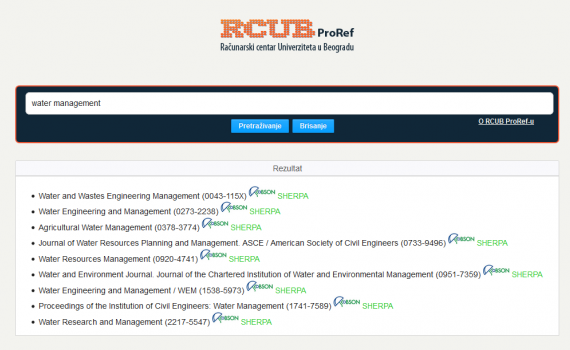
EIFL Guest Blogger, EIFL Open Access Programme Coordinator in Serbia, Milica Ševkušić, shares ideas for helping Serbian researchers obtain discounts and waivers and for raising researchers’ awareness about Article Processing Charges (APCs).
Like their colleagues in other middle-income countries, researchers in Serbia have insufficient research budgets, which means that publishing fees charged by open access (OA) journals are often unaffordable for them. Furthermore, in Serbia, there is no central national fund to cover publishing fees, i.e. Article Processing Charges (APCs). The national open science policy, adopted in 2018, recognizes APCs as eligible costs if included in project proposals, but the effect of the policy is yet to be seen, as the research funding system in Serbia is currently transitioning to institutional funding.
Despite insufficient funds, it is apparent that an increasing number of Serbian researchers are publishing in fee-based OA journals. Early in 2019, the University of Belgrade conducted a survey to establish the amount of APCs paid to publishers, and the funding sources of the APCs. As reported on the OpenAPC project website, the research found that from 2017 - 2019 a total of €30,328 was paid, covering APCs for 34 articles published by researchers from the University of Belgrade, an average of €892 per article. Nearly 40% of researchers paid APCs from their own pockets. It also found that while some authors succeeded in obtaining discounts or full waivers for APCs, a significant number of researchers were not aware of such opportunities.
Immediately after the survey, the University of Belgrade started negotiations with the OA publishers whose journals were favoured by the respondents. The first discount agreement was concluded between the University of Belgrade and OA publisher MDPI in mid-2019.
Improving awareness about APC waivers and discounts
Action has been taken to improve awareness about APC waivers and discounts by making it easier for authors to be informed about various possibilities offered by publishers.
Late in 2019, an existing website used by the staff of the University of Belgrade, RCUB ProRef, was upgraded and revamped by the development team of the University of Belgrade Computer Centre to include information about APC waivers and discounts taken from the journals’ websites. The RCUB ProRef database covers all journals ranked by the Serbian Ministry of Education, Science and Technological Development and those from the University of Belgrade’s additional list used in promotion procedures. Among other things, RCUB ProRef has been used by researchers and members of promotion committees to check the ranking of journals in the national research evaluation system.
Early in 2020, the RCUB ProRef database was further enriched with information about waivers and discounts negotiated by EIFL – namely, the information from the country sheet for Serbia and instructions on how to claim a waiver/discount available on EIFL’s website.
How do researchers use RCUB ProRef services?
RCUB ProRef, which is publicly available, has a very simple interface and it may be searched by any term from the journal's title, ISSN and even an article's DOI. The results list shows journal titles meeting the search criteria accompanied with the links to the journals' self-archiving policies in SherpaRomeo and e-resources provided through the national library consortium Kobson (access to these e-resources is not publicly available).
A detailed journal record in RCUB ProRef shows a journal's ranking (by means of colour coding) in the national journal evaluation system and the information about APC waivers and discounts. The information is available in a tooltip triggered by moving the mouse over the APC sign just below the journal's title and it includes the basis for the waiver/discount, the size of the discount, and instructions on how to claim the waiver/discount. RCUB ProRef does not contain information about journals’ impact factors because this information is not publicly available. However, it is updated with each new edition of Journal Citation Reports (JCR) because the national journal ranks are closely tied to impact factors. The service will also be updated with the information about APC waivers/discounts each time a new piece of relevant information is available.
 Helping researchers find journal ranking information
Helping researchers find journal ranking information
The RCUB ProRef service seeks to meet multiple needs of local researchers. Promotion requirements in Serbia still heavily rely on journal ranks, and services that make it easy to verify the ranking information are cherished by researchers. At the same time, the national open science policy, adopted in 2018, and institutional policies adopted by an increasing number of universities and research organizations in Serbia require that researchers make their outputs OA. RCUB ProRef supports this growing orientation towards OA by making it easier to find information about APC waivers/discounts and journals’ self-archiving policies. It helps researchers in making decisions about where to publish so as to reconcile OA mandates with promotion requirements. At the same time, it helps librarians in providing reliable information about publishing opportunities.
The service has been readily accepted by researchers. The positive feedback received from users shows that upgrading a framework that is easily recognizable to them with new functionalities has been a good idea. This solution is good in terms of maintenance as well, because it is easier and cheaper to maintain one integrated service than several unconnected tools. The development team keeps tracks of visits (in this early stage there are about 60 visits a day on average, from all parts of Serbia).
As the true indicators of success are a better utilization of waivers/discounts and an increased number of OA articles published by Serbian researchers, the RCUB team will encourage researchers and librarians to provide their feedback regarding possible improvements to RCUB-Profef as often as possible, and it will remain receptive to their suggestions.
SHARE / PRINT







